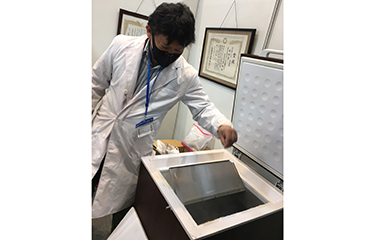A Japan-based company has unveiled a new type of liquid freezer it has dubbed the “Food Time Machine” for its ability to rapidly freeze food.
The Food Service Division of Kawagoe City, Saitama Prefecture-based Howshow Co. introduced the "Food Time Machine" at Seafood Show Osaka, which took place 21 and 22 February at ATC Hall in Osaka, Japan.
According to Howshow CEO Koichi Nii, the Food Time Machine is capable of freezing a piece of sashimi in just one minute. Though he didn’t have a sample on hand to demonstrate at Seafood Show Osaka, he showed the process of using the freezer. The important point, he said, is that when a vacuum-packed food item is inserted into the machine’s liquid bath – which contains silica – the user pushes a button to initiate vibration that continues for a couple of minutes and then automatically stops. The process helps freeze food, including seafood, rapidly.
The innovative point of the Food Time Machine, vibration, enhances thermal conductivity in solids because it allows for more-efficient transfer of thermal energy between atoms or molecules. Thermal energy is transferred through solids by the vibration of their constituent atoms or molecules. When neighboring atoms vibrate in a material, they transfer energy to each other, leading to the propagation of thermal energy through the material.
If the vibration of the atoms is hindered or dampened, the transfer of thermal energy is slowed. The silica works as a vibration aid by providing a stable lattice structure that can support and enhance the vibrational motion of neighboring atoms. An easy way to understand this is to simply say that it gives a hard structure for the atoms to rub against. In addition to domestic sales in Japan, Nii said the company is hoping to export the machines, but he has no experience in exports so far. While he is aware of a line of similar competing machines, the machine his company is promoting differs from competitors due the addition of vibration.
The primary competition is the Tomin line of liquid freezers, produced by Yokohama, Japan-based Technican Co. The Tomin machines use a mixture of ethyl alcohol and water to achieve a temperature of minus-30 degrees Celsius. Ethyl alcohol has a freezing point lower than water, so it can freeze seafood while remaining liquid. Since liquid has 20 times the thermal conductivity of air, liquid freezers can freeze food much faster than conventional freezers. The Tomin machine was displayed at the same venue in 2016.
Compared to the Tomin line of freezers, the Food Time Machine uses a liquid that is 83.15 percent ethanol, 16.84 percent purified water, less than 1 percent sodium lactate, and less than 0.01 percent each of hydrophilic carbon, a plant-based ultra-low-temperature stabilizing agent. The liquid also contains hydrophilic silica as a lattice-vibration aid.
Because of the higher alcohol percentage, the Food Time Machine operates at minus-60 degrees Celsius, or 30 degrees lower than the TOMIN line machines. Conventional freezers work at between minus-15 degrees and minus-20 degrees Celsius.
Freezing at lower temperatures has advantages, including ...
Photo by Chris Loew/SeafoodSource








